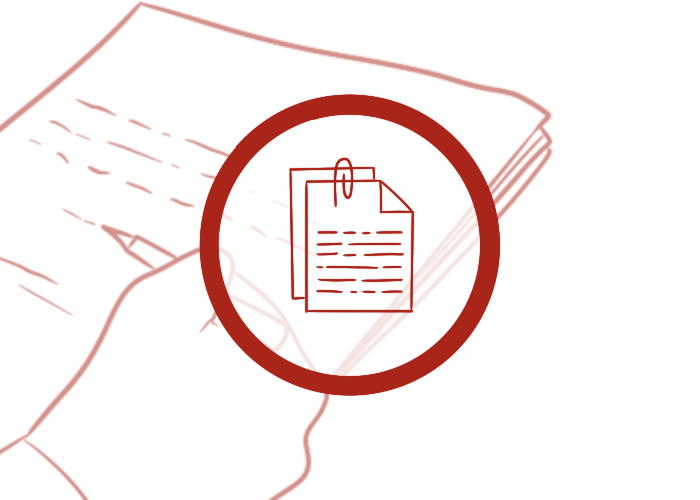Check out the Graphics
Our Voice Matters campaign: from barriers to democratic participation of migrant women
The “Our Voice Matters” campaign used visually engaging graphics to raise awareness of the barriers faced by migrant women and promote their participation in Europe, enhancing retention of key research findings.
BY

The “Our Voice Matters” campaign aimed to share findings and recommendations from the WE-EMPOWER research reports by using social media.
Visual graphics were created with several key messages to raise awareness the barriers migrant women face as well as highlighting the importance of promoting the participation of migrant women in Europe.
WE-EMPOWER partners also used the graphics when disseminating the reports on their channels which was accompanied with translated tailored messaging.
Graphics are an effective communication tool for disseminating key messages from research studies because they present complex information in a visually engaging and easily understandable way. Graphics, such as these help enhances retention and recall, making research findings more memorable.
The campaign was launched in the languages of the six participating countries with country-specific posts in the following languages: Danish, English, French, German, Italian and Serbian. Scroll down to find all graphics and captions in the various languages available for posting from any account who wishes to raise awareness about the reports.
Europe paper (in English and Dutch)
Instagram (square)
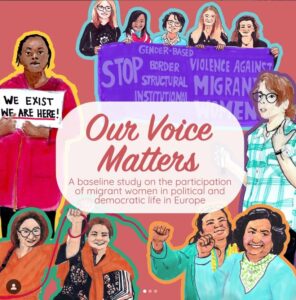
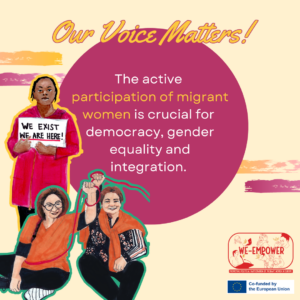
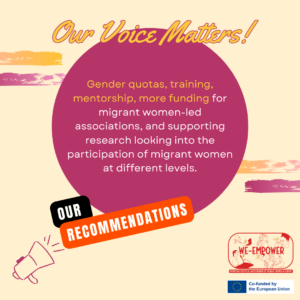
♀️ WIDE+ and our partners are thrilled to launch this series of study papers about migrant women’s participation in political and democratic life in Europe as part of our WE-EMPOWER project: https://wideplus.org/wp-content/uploads/2023/05/EU-studies-all.pdf
📝The first study paper looks at the state of migrant women’s participation at a European level; unsurprisingly, there are many barriers to participation including the lack of electoral rights, intersectional discrimination, hate speech, online violence and under-representation in the media.
There are no known actions by EU institutions to promote or increase the participation of migrant women in politics or in democratic life, but here are our recommendations:
💡The participation of migrant women can be improved through gender quotas, training and mentorship, more funding for migrant women-led associations, and supporting research looking into the participation of migrant women at national, regional, and transnational levels across Europe.
Twitter/Facebook (landscape)
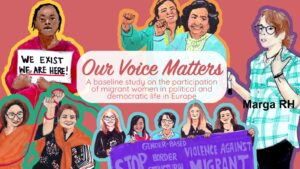

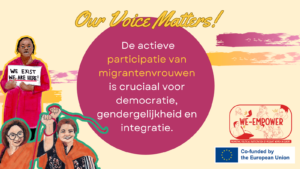
English
Thread A:
Thread 1 out of 2 + Image 1:
♀️ WIDE+ and our partners are thrilled to launch this series of study papers about migrant women’s participation in political and democratic life in Europe as part of our WE-EMPOWER project: https://buff.ly/3LOoZ71
#MigrantWomenParticipate #WeEmpower2023
Thread 2 out of 2:
Partners: @AxSolidaridad , @RedLatinas , @atinango , @adrimilano1 , @GadipAnd , Gabriela Germany, Romanian Women’s Lobby, KULU Denmark
Thread B:
Thread 1 out of 5 + Image 2:
The first paper by @feministWIDE looks at the state of migrant women’s political and democratic participation at a European level; unsurprisingly, there are many barriers to participation: https://buff.ly/45rRPRI
#MigrantWomenParticipate #WeEmpower2023
Thread 2 out of 5:
Barriers to migrant women’s participation include the lack of electoral rights; intersectional discrimination, hate speech, online violence and under-representation in the media.
Thread 3 out of 5:
There are no known actions by EU institutions to promote or increase the participation of migrant women in politics or in democratic life, but here are our recommendations
Thread 4 out of 5:
Participation of migrant women can be improved through gender quotas, training and mentorship, more funding for migrant women-led associations, and supporting research looking into the participation of migrant women at national, regional, and transnational levels across Europe.
Thread 5 out of 5:
Partners: @AxSolidaridad , @RedLatinas , @atinango , @adrimilano1 , @GadipAnd , Gabriela Germany, Romanian Women’s Lobby, KULU Denmark
Dutch
Thread 1 out of 5 + Image 3:
In de studie @feministWIDE wordt gekeken naar de politieke participatie van migrantenvrouwen op Europees niveau; het zal geen verbazing wekken dat er veel belemmeringen zijn voor participatie: https://buff.ly/46xVPBg
#MigrantWomenParticipate #WeEmpower2023
Thread 2 out of 5:
Belemmeringen voor de participatie van migrantenvrouwen zijn onder andere het gebrek aan kiesrechten, intersectionele discriminatie, haatzaaien, online geweld en ondervertegenwoordiging in de media.
Thread 3 out of 5:
Er zijn geen acties op EU-niveau bekend om de participatie van migrantenvrouwen in de politiek of het democratische leven te bevorderen of te vergroten, maar hier zijn onze aanbevelingen :
Thread 4 out of 5:
De participatie van migrantenvrouwen kan worden verbeterd door genderquota, training en mentorschap, meer financiering voor door migrantenvrouwen geleide verenigingen en ondersteuning van onderzoek naar de participatie van migrantenvrouwen op verschillende niveaus.
Thread 5 out of 5:
Partners: @AxSolidaridad , @RedLatinas , @atinango , @adrimilano1 , @GadipAnd , Gabriela Germany, Romanian Women’s Lobby, KULU Denmark
Additional text for LinkedIn in English
Migrant women in Europe face many barriers when it comes to participation in political and democratic life. The active participation of migrant women is not only a crucial aspect of integration, but also essential for gender parity and democracy. Under the framework of the WE-EMPOWER project, WIDE+ and our partners delve into the specific details of these challenges in a series of study papers based on research done in Denmark, Italy, Germany, Serbia and Europe overall. In general, we find that these barriers are similar across the board, including the lack of electoral rights, intersectional discrimination, lack of economic opportunities, and under-representation of migrant women in the media. Read the papers here: https://wideplus.org/wp-content/uploads/2023/05/EU-studies-all.pdf
Additional text for Facebook in English
Migrant women in Europe face many barriers when it comes to participation in political and democratic life. The active participation of migrant women is not only a crucial aspect of integration, but also essential for gender parity and democracy. Under the framework of the WE-EMPOWER project, WIDE+ and our partners delve into the specific details of these challenges based on research done in Denmark, Italy, Germany, Serbia and Europe overall. In general, we find that these barriers are similar across the board, including the lack of electoral rights, intersectional discrimination, lack of economic opportunities, and under-representation of migrant women in the media. Read the papers here: https://wideplus.org/wp-content/uploads/2023/05/EU-studies-all.pdf
Denmark paper (in English and Danish)
Instagram (square)
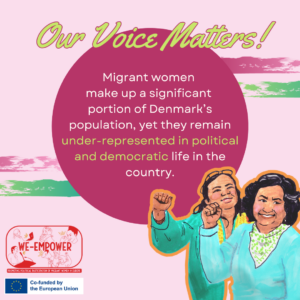
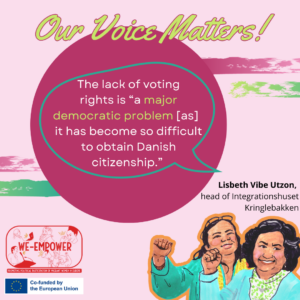
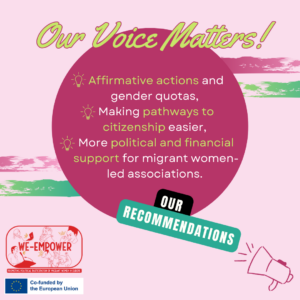
Migrants and migrant women specifically make up a significant portion of Denmark’s population, yet they remain under-represented in political and democratic life in the country.
According to Denmark’s 2021 national statistics, there were 300,000 migrant women, of whom 80,000 had Danish citizenship. During this time, Denmark’s population is 5.8 million.
🔎 The study paper by @kulu_kvindernesulandsudvalg also found that one of the barriers to political participation is the rhetoric from the Danish Parliament which stigmatises, alienates, and disenfranchises migrant women.
Read the 📝 here: https://wideplus.org/wp-content/uploads/2023/08/3KULU_ENG_with-cover_updated.pdf
Some of the barriers to participation include: lack of voting rights which limits migrant women’s agency and alienates them; facing racial discrimination and xenophobia in different domains of life; negative and limited representation of migrant women in the media.
💡 We recommend that Danish authorities enhance opportunities for migrant women to take up more leadership roles in decision-making positions, among other actions.
Twitter/Facebook (landscape)
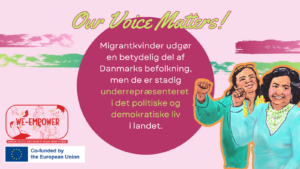
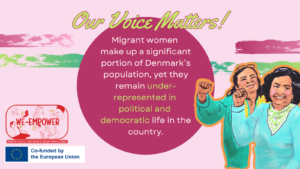
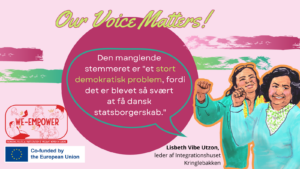
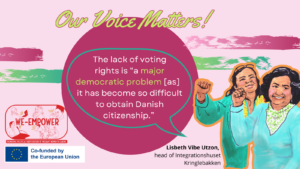
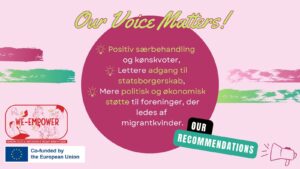

English
Thread 1 out of 5 + Image 1 in English:
Migrants and migrant women specifically make up a significant portion of Denmark’s population, yet they remain under-represented in political and democratic life in the country.
Read the by KULU Denmark here: https://buff.ly/3tqPXvo#MigrantWomenParticipate #WeEmpower2023
Thread 2 out of 5:
According to Denmark’s 2021 national statistics, there were 300,000 migrant women, of whom 80,000 had Danish citizenship. During this time, Denmark’s population is 5.8 million.
Thread 3 out of 5:
🔎 The study paper by KULU also found that one of the barriers to political participation is the rhetoric from the Danish Parliament which stigmatises, alienates, and disenfranchises migrant women. #MigrantWomenParticipate #WeEmpower2023
Thread 4 out of 5 + Image 2 in English:
Some of the barriers to participation include: lack of voting rights which limits migrant women’s agency and alienates them; facing racial discrimination and xenophobia in different domains of life; negative and limited representation of migrant women in the media.
Thread 5 out of 5 + Image 3 in English:
We recommend that Danish authorities enhance opportunities for migrant women to take up more leadership roles in decision-making positions, among other actions.
Danish
Thread 1 out of 5 + Image 1 in Danish:
Migranter og især migrantkvinder udgør en betydelig del af Danmarks befolkning, men de er stadig underrepræsenterede i det politiske og demokratiske liv i landet.
Læs af KULU Danmark her: https://buff.ly/3tqPXvo#MigrantWomenParticipate #WeEmpower2023
Thread 2 out of 5:
Ifølge Danmarks nationale statistik fra 2021 var der 300.000 migrantkvinder, hvoraf 80.000 havde dansk statsborgerskab. I dette tidsrum er Danmarks befolkning på 5,8 millioner.
Thread 3 out of 5:
🔎 Undersøgelsen viste også, at en af barriererne for politisk deltagelse er retorikken fra det danske folketing, som stigmatiserer, fremmedgør og fratager migrantkvinder deres rettigheder. #MigrantWomenParticipate #WeEmpower2023
Thread 4 out of 5 + Image 2 in Danish:
Nogle af barriererne for deltagelse omfatter: manglende stemmeret, som begrænser migrantkvinders handlefrihed og fremmedgør dem; at blive udsat for racediskrimination og fremmedhad på forskellige områder af livet; negativ og begrænset repræsentation af migrantkvinder i medierne.
Thread 5 out of 5 + Image 3 in Danish:
Vi anbefaler blandt andet, at de danske myndigheder forbedrer migrantkvinders muligheder for at påtage sig flere lederroller i beslutningstagende stillinger.
Italy paper (in English and Italian)
Instagram (square)
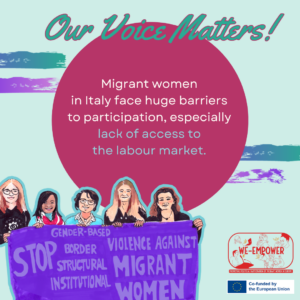
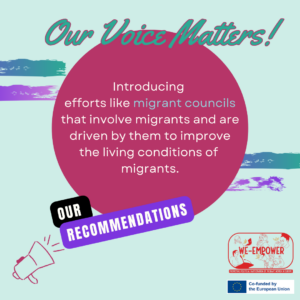
Migrants represent 7.5% of the population in Italy, and more than half are women, yet they have significant issues in participation in Italy.
Read the 📝 by @romanianwomenlobby and Associazione Donne Romene in Italia – ADRI here: wideplus.org/wp-content/uploads/2023/08/2ROWL_ENG.pdf
According to official data, there is a higher female percentage amongst migrants from Eastern Europe – 60% Romanians and 78% Ukrainians, and many are employed as domestic workers.
🔎 The study paper by ROWL and ADRI found that in Italy, only 1 in 2 migrant women worked and they are poorer than the European average. The lack of access to decent work is a huge barrier to participation. Migrant women workers not only earn 17% less than the general average of migrants, but also 28.2% less than Italian female workers.
💡 Our recommendations to the Italian authorities include introducing efforts like migrant councils that involve migrants and are driven by them to improve the living conditions of migrants and support more NGO-run projects. #MigrantWomenParticipate#WeEmpower2023
Twitter/Facebook (landscape)
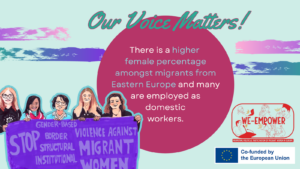
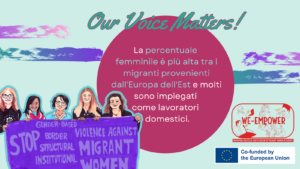
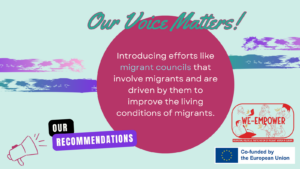
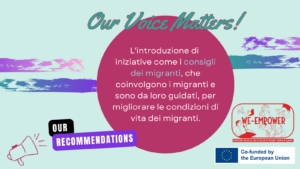
English
Thread 1 out of 5 + Image 1 in English:
Migrants represent 7.5% of the population in Italy, and more than half are women, yet they have significant issues in participating in political and democratic life in Italy. Read the report by Romanian Women’s Lobby and @adrimilano1 here: https://buff.ly/3RRdY8P
Thread 2 out of 5:
According to official data, there is a higher female percentage amongst migrants from Eastern Europe – 60% Romanians and 78% Ukrainians, and many are employed as domestic workers. #MigrantWomenParticipate #WeEmpower2023
Thread 3 out of 5:
🔎 The study paper by ROWL and ADRI found that in Italy, only 1 in 2 migrant women worked and they are poorer than the European average. The lack of access to decent work is a huge barrier to participation. #MigrantWomenParticipate #WeEmpower2023
#MigrantWomenParticipate #WeEmpower2023
Thread 4 out of 5:
Migrant women in Italy face huge barriers to participation, especially lack of access to the labour market. Migrant women workers not only earn 17% less than the general average of migrants, but also 28.2% less than Italian female workers.
Thread 5 out of 5 + Image 2 in English:
We recommend that more efforts to include women in politics or public decision making can be made through actions like migrant councils and supporting migant women-led associations. #MigrantWomenParticipate #WeEmpower2023
Italian
Thread 1 out of 5 + Image 1 in Italian:
I migranti rappresentano il 7,5% della popolazione italiana e più della metà sono donne, eppure hanno notevoli problemi di partecipazione in Italia. Leggi di Romanian Women’s Lobby e @adrimilano1 qui: https://buff.ly/46lSs0B#MigrantWomenParticipate #WeEmpower2023
Thread 2 out of 5:
Secondo i dati ufficiali, la percentuale femminile è più alta tra i migranti provenienti dall’Europa dell’Est – 60% di rumeni e 78% di ucraini – e molti sono impiegati come lavoratori domestici. #MigrantWomenParticipate #WeEmpower2023
Thread 3 out of 5:
🔎 Il documento di studio ha rilevato che in Italia solo una donna migrante su due lavora e che è più povera della media europea. La mancanza di accesso a un lavoro dignitoso è un’enorme barriera alla partecipazione.
Thread 4 out of 5:
Le donne migranti in Italia devono affrontare enormi barriere alla partecipazione, in particolare la mancanza di accesso al mercato del lavoro. Le lavoratrici migranti guadagnano il 17% in meno della media generale dei migranti e il 28,2% in meno delle lavoratrici italiane.
Thread 5 out of 5 + Image in Italian:
Raccomandiamo di compiere maggiori sforzi per includere le donne nella politica o nel processo decisionale pubblico attraverso azioni come i consigli dei migranti e il sostegno alle associazioni guidate da donne migranti.
Germany paper (in English and German)
Instagram (square)
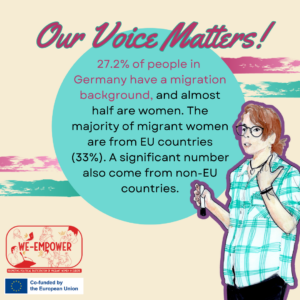
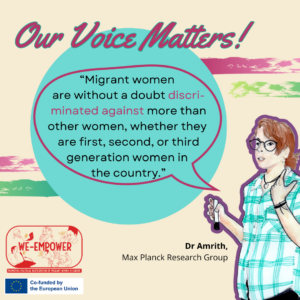
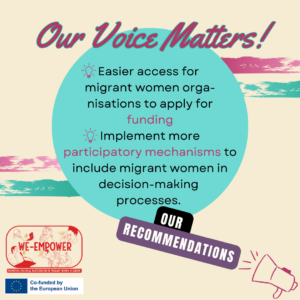
In Germany, around 11 million women have a migrant background, the majority of them are from EU countries (33%) led by Poland, Romania, Italy, Croatia and Greece. A significant number also come from non-EU countries such as Turkey, Russia, Syria, Afghanistan and Kazakhstan.
Women, especially migrant women, are still under-represented in decision-making bodies in Germany. Read the 📝 by Gabriela Germany here: https://wideplus.org/wp-content/uploads/2023/08/2GABRIELA_ENG.pdf
🔎 The study paper by Gabriela found that the representation of women with migrant backgrounds was marginal in the last 2 federal elections – migrant women make up 37 out of 735 MPs.
💡 We recommend that German authorities improve the participation of migrant women by fostering a more welcoming atmosphere towards migrants.
#MigrantWomenParticipate#WeEmpower2023
Twitter/Facebook (landscape)
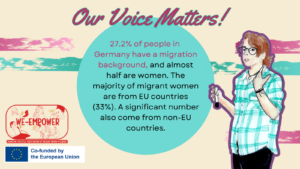
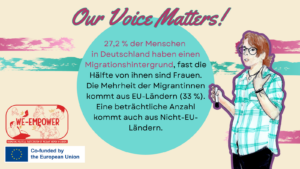
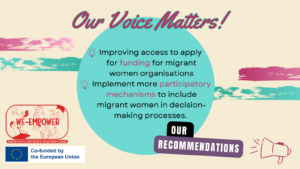
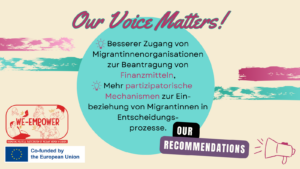
English
Thread 1 out of 5 + Image 1 in English:
In Germany, around 11 million women have a migration background, the majority of them are from EU countries (33%) led by Poland, Romania, Italy, Croatia and Greece. A significant number also come from non-EU countries such as Turkey, Russia, Syria, Afghanistan and Kazakhstan.
Thread 2 out of 5:
Women, especially migrant women, are still under-represented in decision-making bodies.
Read the by Gabriela Germany here: https://buff.ly/3tpgLfo #MigrantWomenParticipate #WeEmpower2023
Thread 3 out of 5:
🔎 The study paper by Gabriela found that the representation of women with migrant backgrounds was marginal in the last 2 federal elections – migrant women make up 37 out of 735 MPs.
#MigrantWomenParticipate #WeEmpower2023
Thread 4 out of 5 + Image 2 in English:
We recommend that German authorities improve the participation of migrant women by fostering a more welcoming atmosphere towards migrants.
#MigrantWomenParticipate #WeEmpower2023
Thread 5 out of 5:
Partners: @AxSolidaridad, @RedLatinas, @atinango, @adrimilano1, @GadipAnd, Gabriela Germany, Romanian Women’s Lobby, KULU Denmark
German
Thread 1 out of 4 + Image 1 in German:
In Deutschland haben ca.11 Mio. Frauen einen Migrationshintergrund. Die meisten kommen aus EU-Ländern (33 %), allen voran Polen, Rumänien, Italien, Kroatien und Griechenland. Eine beträchtliche Anzahl kommt auch aus Nicht-EU-Ländern wie der Türkei, Russland, Syrien, Afghanistan.
Thread 2 out of 4:
Frauen, insbesondere Migrantinnen, sind in Entscheidungsgremien in Deutschland immer noch unterrepräsentiert. Lesen Sie das hier: https://buff.ly/3FsVZhX #MigrantWomenParticipate #WeEmpower2023
Thread 3 out of 4:
🔎 In der Studie wurde festgestellt, dass die Repräsentation von Frauen mit Migrationshintergrund bei den letzten beiden Bundestagswahlen marginal war – 37 von 735 Abgeordneten sind Migrantinnen.
Thread 4 out of 4 + Image 2 in German:
Wir empfehlen den deutschen Behörden, die Beteiligung von Frauen mit Migrationshintergrund zu verbessern, indem sie eine einladende Atmosphäre für Migranten schaffen.#MigrantWomenParticipate #WeEmpower2023
Serbia paper (in English and Serbian)
Instagram (square)
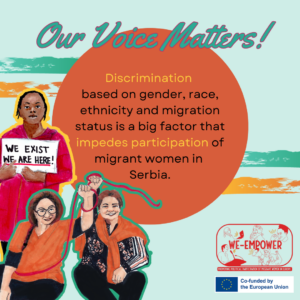
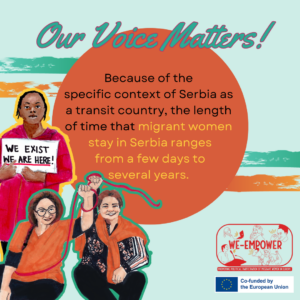
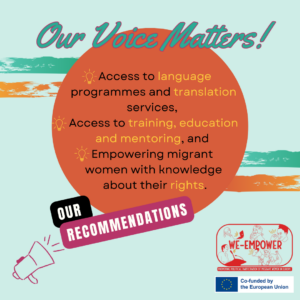
Since 2015, Serbia has been a transit country for about 1,5 million refugees passing through the Balkan route – it is hard to determine the exact number of women migrants in Serbia.
Read the 📝 by NGO Atina here: https://buff.ly/3tmOAxI
🔎 The study paper by NGO Atina found that migrant women in Serbia face numerous obstacles and discrimination, which makes their integration into society and participation in public life even more difficult.
Respondents in a survey conducted by NGO Atina shared that they encountered discriminatory attitudes from healthcare professionals, employers and state institutions.
💡 We recommend that Serbian authorities adopt an integrated approach to address all the challenges that impede participation of migrant women. See our recommendations in the image.
Twitter/Facebook (landscape)

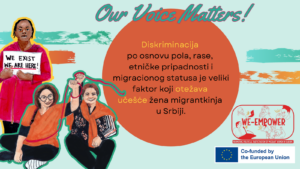
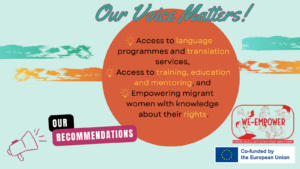
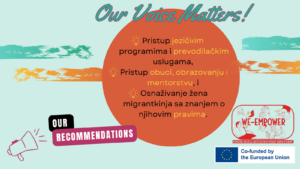
English
Thread 1 out of 4 + Image 1 in English:
Since 2015, Serbia has been a transit country for about 1,5 million refugees passing through the Balkan route – it is hard to determine the exact number of women migrants in Serbia.
Read the by @atinango here: https://buff.ly/3tmOAxI
#MigrantWomenParticipate #WeEmpower2023
Thread 2 out of 4:
🔎 The study paper by @atinango found that migrant women in Serbia face numerous obstacles and discrimination, which makes their integration into society and participation in public life even more difficult.
Thread 3 out of 4:
Respondents in a survey conducted by NGO Atina shared that they encountered discriminatory attitudes from healthcare professionals, employers and state institutions.
#MigrantWomenParticipate #WeEmpower2023
Thread 4 out of 4 + Image 2 in English:
We recommend that Serbian authorities adopt an integrated approach to address all the challenges that impede participation of migrant women. See our recommendations in the image.
@AxSolidaridad, @RedLatinas, @atinango, @adrimilano1, @GadipAnd, Gabriela Germany, ROWL, KULU
Serbian
Thread 1 out of 4 + Image 1 in Serbian:
Srbija je od 2015. godine do danas bila tranzitna zemlja za oko 1,5 milion izbeglica koje prolaze balkanskom rutom – teško je utvrditi tačan broj žena migrantkinja u Srbiji.
Pročitajte @atinango ovde: https://buff.ly/3rJIdEc
#MigrantWomenParticipate #WeEmpower2023
Thread 2 out of 4:
🔎 U studiji koju je kreirala @atinango utvrđeno je da se žene migrantkinje u Srbiji suočavaju sa brojnim preprekama i diskriminacijom, što dodatno otežava njihovu integraciju u društvo i učešće u javnom životu.
Thread 3 out of 4:
Ispitanice u anketi koju je sprovela @atinango rekle su da su se susrele sa diskriminatornim stavovima zdravstvenih radnika, poslodavaca i predstavnika državnih institucija. #MigrantWomenParticipate #WeEmpower2023
Thread 4 out of 4 + Image 2 in Serbian:
💡 Preporučujemo da srpske vlasti usvoje integrisani pristup za rešavanje svih izazova koji ometaju učešće žena migrantkinja. Pogledajte naše preporuke na slici.
@AxSolidaridad, @RedLatinas, @atinango, @adrimilano1, @GadipAnd, Gabriela Germany, Romanian Women’s Lobby, KULU
Spain paper (in English and Spanish)
Instagram (square)
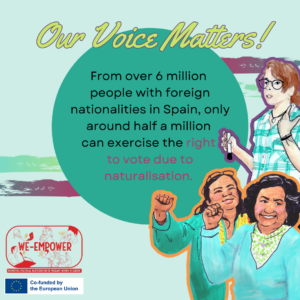
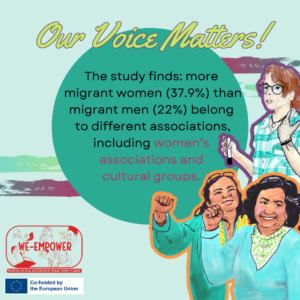
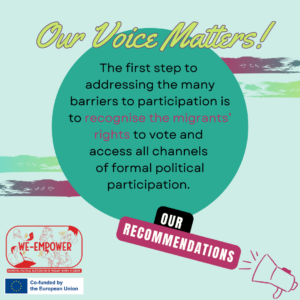
WE-EMPOWER partner @redlatinasydelcaribe published a Spain-wide study on participation of migrants, including conducting a survey with with 1,400 migrants (including those who have been naturalised). To read the 📝 in English, go to: https://tinyurl.com/3sknvx8d
When it comes to political participation and exercising electoral rights, the study found that while there are over 6 million people with foreign nationalities in Spain, only around half a million can exercise the right to vote due to naturalisation.
🔎 In the study, it became evident that migrant women, as compared with migrant men, show a greater willingness to participate in democratic life, despite not having electoral rights. Also, more migrant women, 37.9%, than migrant men, 22% belong to different associations, including women’s associations and cultural groups.
💡 While there remain many barriers to participation of migrant women in Spain, @redlatinasydelcaribe recommends that the first step to addressing these barriers is to recognise migrants’ right to vote and access to all channels of formal political participation.
Twitter/Facebook (landscape)
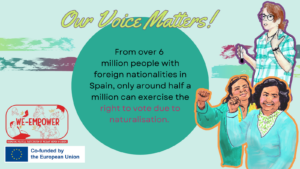
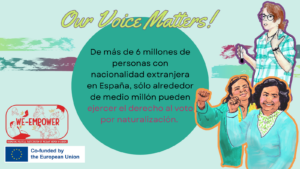

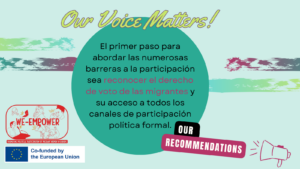
English
Thread 1 out of 3 + Image 1 in English:
WE-EMPOWER partner @RedLatinas published a Spain-wide study on participation of migrants, including conducting a survey with with 1,400 migrants (including those who have been naturalised). To read the 📝 in English, go to: https://buff.ly/3PTjyoS
Thread 2 out of 3:
🔎 In the study, it was found that migrant women, as compared with migrant men, show a greater willingness to participate in democratic life, despite not having electoral rights. Also, more migrant women (37.9%) than migrant men (22%) belong to different associations.
Thread 3 out of 3 + Image 2 in English:
💡 @RedLatinas provides a series of recommendations, at the state, local and associative levels, reiterating the importance of full recognition of the right to vote for all migrants residing in Spain.
Spanish
Thread 1 out of 3 + Image 1 in Spanish:
@RedLatinas, socio de WE-EMPOWER, ha publicado un estudio sobre la participación de los inmigrantes en España, que incluye una encuesta a 1.400 inmigrantes (incluidos los nacionalizados). Para leer el 📝 en español, visite: https://buff.ly/46uaCxh
Thread 2 out of 3:
🔎 En el estudio se constató que las mujeres migrantes, en comparación con los hombres migrantes, muestran una mayor disposición a participar en la vida democrática, a pesar de no tener derechos electorales. Asimismo, más mujeres migrantes pertenecen a diferentes asociaciones.
Thread 3 out of 3 + Image 2 in Spanish:
💡 @RedLatinas aporta una serie de recomendaciones, a nivel estatal, local y asociativo, reiterando la importancia del pleno reconocimiento del derecho al voto para todos los migrantes residentes en España.


